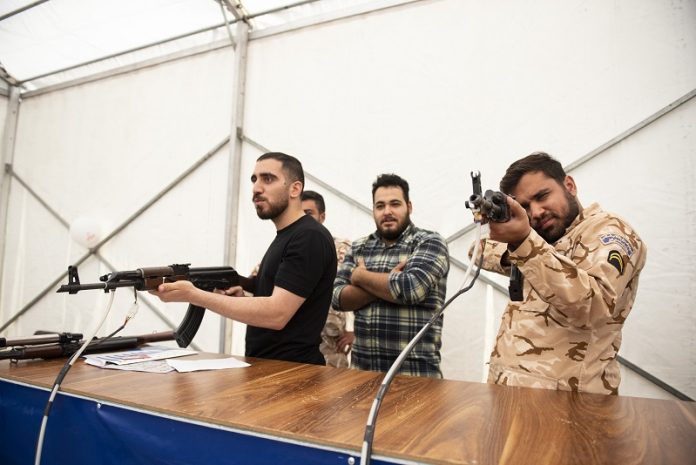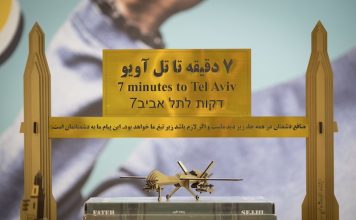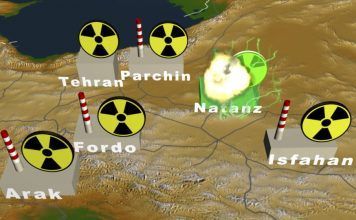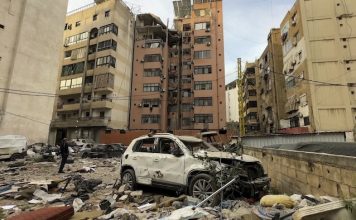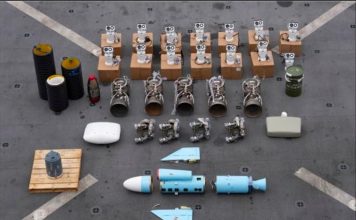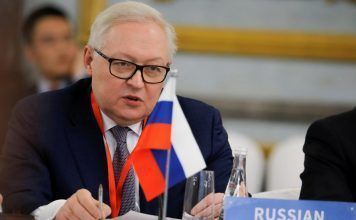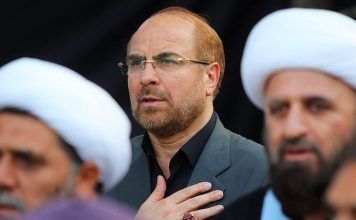By Ahmad Rafat
The arrest of two individuals in the Netherlands has exposed a strong link between the security agencies of the Islamic Republic and the infamous “Mocro-Maffia” drug gang operating in the Netherlands and Belgium. Iran allegedly uses professional assassins from European criminal organizations to eliminate its opponents, a level of cooperation that will most likely persist.
Mehrez Ayari, a Tunisian-French man, was recently detained by Dutch police at the request of Madrid’s judicial authorities. Police sought Ayari on murder charges under international arrest warrants from France and Spain. The identification of Ayari was facilitated by information provided by Chahinez Kadid, a 27-year-old Dutch woman of Moroccan descent, whom the Spanish Judiciary has implicated in aiding Ayari.
Swedish Security Service Says Iran Uses Criminal Networks in Sweden
The Spanish National Court (SNC) has accused Kadid of providing financial help to Ayari. The Dutch Supreme Court is examining a petition for Kadid’s extradition to Spain. Kadid denies knowledge of any plots involving the assassination of opponents of the Islamic Republic in Spain, the Netherlands, and Denmark.
Ayari was apprehended on June 6 in Haarlem, Netherlands, for plotting to use a firearm to assassinate Siamak Tadayon Tahmasebi, an individual of Iranian descent. Subsequent investigations revealed that Ayari had also devised a plan to eliminate a rap artist named Shaheen-Loo, who lives in Denmark. Both individuals from Iran have been moved to secure locations by the Dutch and Danish law enforcement agencies because of concerns that members of the Mocro Maffia might enlist other professional criminals to target them.
US Received Intel of Iranian Plot to Assassinate Trump, CNN Reports
Ayari initially caught the attention of the Spanish Central Prosecutor’s Office during the investigation into a failed assassination plot targeting Alejo Vidal-Quadras, a prominent Spanish political figure, in November 2023 in Madrid. Vidal-Quadras, the spokesperson for Vox, a Spanish far-right political party, was shot in the face by an individual on a motorcycle. He sustained a fractured jawbone that required surgery.
After narrowly escaping the assassination attempt, Vidal-Quadras, a former two-time vice-president of the European Parliament, immediately accused the Iranian regime. However, Spanish authorities did not treat these allegations with much gravity. Prior to this incident, French law enforcement had issued an international arrest warrant for Ayari in connection with a separate homicide.
However, following the initial arrests, it emerged that the people behind the assassination plot targeting Vidal-Quadras were in Tehran. Authorities revealed that Vidal-Quadras had been a target of terrorist groups supported by the Islamic Republic for the preceding two years. Besides Ayari and Kadid, several other individuals were apprehended in Spain, and one person was detained in Colombia in connection with the attempted assassination of Vidal-Quadras.
In January, Colombian authorities apprehended Greg Oliver Higuera Marcano, a 25-year-old Venezuelan man, based on an international arrest warrant issued by Spain. Marcano, who had converted to Shia Islam, was allegedly riding a motorcycle with Ayari as a passenger, purportedly en route to assassinate Vidal-Quadras. Following the unsuccessful attempt, Marcano reportedly assisted Ayari in fleeing Madrid by accompanying him on a flight from Barajas Airport to Caracas, Venezuela.
Ayari was reportedly transported from Madrid to Portugal by Narayan Gómez Mala, who is another suspect in the assassination plot against Vidal-Quadras. Mala has been in a Spanish prison for several weeks. Police have also detained two Spanish citizens and a British national living in southern Spain in connection with the attempted murder of Vidal-Quadras. Ayari is allegedly a professional hitman whom criminal groups have used on multiple occasions in the past.
Ayari reportedly murdered a member of a criminal organization in France last year, allegedly for betraying the group. The victim’s identification was delayed by several weeks because of the extreme violence of the killing. Experts from the French police suggest that Ayari’s intention behind such a brutal act was not only to eliminate the individual but also to serve as a warning to other members of the gang, cautioning them about the consequences of “disobedience.”
During a telephone interview with Kayhan Life, Francisco de Jorge, the Madrid prosecutor leading the investigation into the Vidal-Quadras assassination plot, said: “It is now clear that the origins of the assassination plot can be linked back to Tehran. With recent arrests made, there is optimism about gathering more comprehensive information regarding Iran’s involvement in the assassination of Alejo Vidal Cuadras.”
The prosecutor expressed eagerness for the extradition of individuals detained in the Netherlands in connection with this case, as their cooperation could illuminate many unresolved aspects.
EXCLUSIVE: Iran’s Gang Leaders Are Refusing to Help IRGC Crush Protests
In a statement released last September, the Iranian Ministry of Intelligence claimed that Shaheen-Loo and Siamak Tadayon Tahmasebi were in contact with a “terrorist” group that authorities had disbanded. The ministry alleged that Shaheen-Loo and Tahmasebi communicated with this group and planned to execute “a series of subversive operations” within the country.
The Islamic Republic of Iran has been implicated in various instances of cooperating with organized crime, including drug trafficking and arms smuggling. This cooperation has been used to target the regime’s opponents abroad. There is evidence of the Islamic Revolutionary Guards Corps Qods Force (IRGC-QF) working with criminal gangs involved in drug trafficking in the Balkan region, Turkey, and the Republic of Azerbaijan. The IRGC-QF has been accused of using these connections to conduct assassinations and kidnappings of the regime’s opponents.
The collaboration between Tehran and the Mocro Maffia, predominantly composed of criminals from North Africa, is not a recent development. As per Spain’s SNC investigation, these ties trace back to the mid-1980s, initially focusing on drug trafficking, particularly heroin.
The first act of political violence associated with the Mocro Maffia is reported to be the killing of Peter R. de Vries, a renowned Dutch investigative journalist and crime reporter, in Amsterdam on July 6, 2021. Subsequently, many Dutch judges reportedly received threats from this criminal group.
Because of these threats, former Prime Minister Mark Rutte, who will assume the Secretary General of NATO role in October, had to be placed under police protection for a while.
Previously, Mocro-Maffia reportedly planned to abduct Catharina-Amalia, Princess of Orange, the daughter of King Willem-Alexander Claus George Ferdinand and Queen Maxima of the Netherlands. Following this incident, the Dutch Crown Prince refrained from attending public events for an extended period.
It is alleged that the Islamic Republic enlisted local criminals to assassinate a 56-year-old Iranian man named Ali Motamed, whose real name was Mohammad Reza Kolahi-Samadi. He had been tried and sentenced to death in absentia by a Revolutionary Court in Iran for his purported involvement in detonating a bomb at the headquarters of the Islamic Republic party in 1981. The bombing killed 73 people, including Mohammad Beheshti, who served as the head of Iran’s Supreme Court and was the secretary general of the Islamic Republic Party.
The intermediary between the individuals responsible for assassinating Kolahi-Samadi and the Islamic Republic was identified as Noffel Fassih, who was associated with Ridouan Taghi, a notorious Moroccan-Dutch criminal figure. Taghi, known for his involvement in drug trafficking in the Netherlands, has reportedly established connections with the security agencies of the Islamic Republic and has visited Iran several times.
Taghi was apprehended in Dubai in 2019 at the behest of the Netherlands and subsequently extradited to the country. The Dutch police investigation revealed that Fassih had been paid 130,000 euros for orchestrating the murder of Kolahi-Samadi, yet he only disbursed 10,000 euros to each of the two individuals who carried out the assassination.
Kolahi-Samadi became a member of the People’s Mojahedin Organization of Iran (PMOI), also known as MKO, following the 1979 Revolution. While with MKO, he also served as a guard for the local Islamic Revolution Committees on Pasteur Street in Tehran. Subsequently, he joined the Islamic Republic Party. Over time, he advanced within the party, taking on roles such as organizing events, conferences, and roundtable discussions. He also held the position of head of security for the party.
Kolahi-Samadi allegedly brought the bomb inside his briefcase to a gathering of the Islamic Republic Party in Tehran. He exited the premises just moments before the explosion. Following the blast, Kolahi-Samadi reportedly sought refuge at the residence of a member of the Mujahedin-e Khalq Organization (MKO) for a period before eventually traveling to Iraq through Iran’s western border. Subsequently, he made his way to Holland.
Taghi, the leader of the criminal group known as the “Angels of Death,” reportedly collaborates with the Mocro Maffia organization. They have been linked to the assassination of Ahmad Mola Nissi, the 52-year-old founder of the Arab Struggle Movement for the Liberation of Ahvaz (ASMLA), who was fatally shot in The Hague in 2017.
On June 11th, Mehran Abbasian, a journalist working for Iran International TV, was moved to a secure place by the Swedish police because of threats to his life. The Swedish authorities revealed that criminal organizations, predominantly composed of individuals from Eastern Europe, were allegedly hired by the Islamic Republic to assassinate Abbasian. During Hamid Nouri’s trial in Stockholm, Abbasian received many threatening messages.
Hamid Nouri, a former Iranian official, was convicted of war crimes and murder in May 2022 by a Swedish court. The court held 93 hearings before delivering the verdict. Nouri was sentenced to life imprisonment. In December 2023, the Svea Court of Appeal upheld his life sentence. Despite these circumstances, Nouri was released and returned to Tehran on June 15 as part of a prisoner exchange deal.

